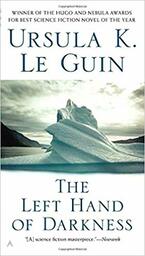|
It is not easy to limit this hauntingly beautiful novel to one central idea. It is about difficulty of communication, about dualism and wholeness, war and civilization, friendship, trust and human relationships. All of this is set in a cold cold world where the mark of civilization is not comfort but survival. The planet of Gethen (Winter) is still in the Ice Age and the two countries described in the book are situated on a relatively small strip of land between ice sheets and glaciers. The most remarkable thing about the Gethenians (from our point of view) is that they are ambisexual: neuter most of the time (or better-said potential) becoming either female or male for a few days. The narrator of the book Genly Ai is an envoy entrusted with making contact and bringing this far away world into the Ekumen union of trade, knowledge and culture exchange. ‘The first Envoy to a world always comes alone. One alien is a curiosity, two are an invasion.’ Genly is open-minded and willing to learn about local ways. He has to navigate around ‘shifgrethor' – prestige, face, place, the pride-relationship, the untranslatable and all-important principle of social authority in…all civilizations of Gethen’. He tries to understand the Gethenian sexual mores- in Gethen anybody ‘can be tied down to childbearing…and nobody is as free as a free male anywhere else’ (the book was written in 1969, things have changed a lot, although not everywhere). He visits a local monastery and takes part in a foretelling ritual that gives him a much better idea of their religious beliefs and practices e.g. the importance of keeping one’s mind clear of abstractions, becoming ‘ignorant’. Yet, he finds it extremely difficult to leave aside his preconceptions and patterns of interaction. I don’t want to give the story away. Its main message is the importance of love, trust and above all, acceptance. Light is the left hand of darkness...
Comments are closed.
|
Archives
April 2024
Categories
All
|



 RSS Feed
RSS Feed
